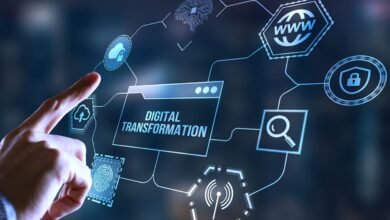The Future of Artificial Intelligence: Trends and Innovations

Artificial intelligence (AI) is no longer a distant concept confined to the realms of science fiction. It has become a reality that is rapidly transforming industries, businesses, and everyday life. From autonomous vehicles to AI-powered chatbots, this technology is reshaping the world, and its potential seems limitless. As we look to the future of artificial intelligence, it is clear that new trends and innovations will continue to push boundaries, creating opportunities and challenges across various sectors.
In this article, we will explore the most promising trends in AI development and the innovations that are set to define the future of this field. We will examine how AI will impact industries like healthcare, finance, and education, and we will also look at the ethical implications and challenges associated with this powerful technology.
AI in Healthcare: Revolutionizing Diagnosis and Treatment
One of the most exciting areas for AI’s future development is healthcare. AI’s ability to process and analyze vast amounts of data with precision and speed can significantly enhance how healthcare providers diagnose diseases, develop treatment plans, and improve patient outcomes.
AI-Driven Diagnostics
Traditionally, diagnosing complex diseases like cancer or neurological disorders requires highly specialized expertise, expensive equipment, and time-consuming procedures. AI has the potential to speed up this process by identifying patterns in medical images and patient data that might be difficult for human clinicians to detect. For example, AI algorithms trained on thousands of medical images can accurately detect early signs of diseases like lung cancer or diabetic retinopathy, offering a more rapid and accurate diagnosis.
Additionally, AI is being used to predict patient outcomes by analyzing data from wearables, electronic health records, and genomic information. AI-powered predictive analytics tools can help physicians make more informed decisions about treatments and care plans, potentially improving recovery rates and saving lives.
AI in Drug Discovery
The drug discovery process is another area where AI is making significant strides. Developing new medications is traditionally a time-consuming and costly endeavor, often taking years of research and billions of dollars to bring a drug to market. However, AI is changing this by accelerating the identification of potential drug candidates.
By utilizing machine learning models that can analyze vast databases of chemical compounds and biological data, AI can predict which molecules are most likely to be effective in treating specific diseases. This not only speeds up the drug development process but also reduces costs, ultimately making life-saving treatments more accessible to patients worldwide.
AI in Finance: Enhancing Decision-Making and Fraud Detection
AI’s ability to analyze massive datasets is also proving invaluable in the finance sector. As financial markets become increasingly complex, AI is being used to enhance decision-making, improve risk management, and detect fraudulent activities.
AI-Powered Financial Analytics
Investment firms and financial institutions are increasingly turning to AI to analyze market trends, predict asset prices, and manage portfolios. By using AI to process and interpret vast amounts of data in real time, financial professionals can make more informed decisions about where to allocate resources. For example, hedge funds are using AI algorithms to predict stock market movements by analyzing historical data, social media sentiment, and news reports.
Moreover, AI is transforming the field of risk management. Financial institutions are using AI-driven tools to assess the risk associated with lending, investments, and insurance policies. These tools can process complex data sets that include market conditions, consumer behavior, and global events, allowing companies to make more accurate predictions about potential risks and returns.
Fraud Detection and Prevention
One of the most critical applications of AI in finance is its ability to detect and prevent fraudulent activities. Cybersecurity threats in the financial sector have become increasingly sophisticated, and traditional methods of fraud detection are no longer sufficient. AI systems can analyze large volumes of transactions in real-time, flagging unusual patterns or behaviors that may indicate fraud.
For example, AI algorithms can monitor credit card transactions, and if a purchase appears suspicious (e.g., a sudden large transaction in a foreign country), the system can immediately freeze the account and alert the customer. This level of speed and accuracy in fraud detection can help financial institutions protect their customers and reduce losses due to fraudulent activities.
AI in Education: Personalized Learning and Administrative Efficiency
AI is also poised to revolutionize education, providing personalized learning experiences and streamlining administrative tasks for educators. As students’ learning needs become more diverse, AI is being used to create adaptive learning platforms that tailor educational content to individual students’ strengths and weaknesses.
Personalized Learning
In traditional classrooms, it can be challenging for teachers to provide individualized attention to every student. However, AI-powered learning platforms can analyze a student’s performance and adapt lessons accordingly. For instance, if a student is struggling with a particular concept, the AI system can offer additional practice problems, tutorials, or videos that target that specific area.
Moreover, AI can provide real-time feedback to students, allowing them to learn at their own pace. This personalized approach to learning ensures that students receive the support they need while enabling teachers to focus on more critical tasks, such as mentoring and curriculum development.
AI for Administrative Efficiency
Beyond the classroom, AI is also improving the efficiency of educational institutions by automating administrative tasks. AI-powered chatbots can handle routine inquiries from students, such as registration deadlines or campus events, freeing up time for staff to focus on more complex issues. Similarly, AI tools can assist in grading assignments, analyzing attendance data, and managing student records.
By reducing the administrative burden on educators, AI enables them to dedicate more time and resources to improving the quality of education for their students.
Ethical Implications and Challenges of AI
While the future of AI is undoubtedly promising, it also raises significant ethical questions and challenges that must be addressed. As AI systems become more advanced, concerns about privacy, bias, and job displacement will become increasingly relevant.
Privacy Concerns
The widespread use of AI technologies relies on the collection and analysis of vast amounts of personal data, ranging from medical records to financial transactions. This raises serious privacy concerns, as individuals may not always be aware of how their data is being used or stored. Additionally, there is the risk that sensitive information could be accessed or misused by malicious actors.
To mitigate these risks, governments and organizations will need to implement robust data protection regulations and ensure that AI systems are designed with privacy and security in mind.
Bias in AI Systems
Another challenge associated with AI is the potential for bias in decision-making. AI algorithms are often trained on historical data, and if that data contains biases, the AI system may perpetuate or even exacerbate those biases. For example, facial recognition technology has been shown to be less accurate when identifying individuals with darker skin tones, which could lead to unfair treatment in areas such as law enforcement or hiring practices.
Addressing bias in AI systems requires ongoing efforts to ensure that the data used for training is diverse and representative. Additionally, AI developers must remain vigilant in monitoring and auditing their systems to identify and rectify any potential biases.
Job Displacement
As AI systems become more capable of performing tasks traditionally done by humans, there is concern that automation could lead to job displacement. Industries such as manufacturing, transportation, and customer service are particularly vulnerable to this shift, as AI-powered robots and chatbots become more widespread.
While AI will undoubtedly change the job market, it also has the potential to create new opportunities. For instance, AI-driven industries will require skilled workers to develop, maintain, and oversee these systems. Therefore, it is essential for governments and educational institutions to invest in retraining programs that prepare the workforce for this transition.
Conclusion: Embracing the Future of AI
The future of artificial intelligence is filled with promise and potential. As AI continues to evolve, it will revolutionize industries such as healthcare, finance, and education, leading to more efficient systems, personalized experiences, and improved outcomes. However, this technological advancement also brings challenges, particularly concerning ethics, privacy, and job displacement.
To fully harness the benefits of AI, it is crucial for governments, businesses, and individuals to work together in shaping a future where AI is developed and used responsibly. By doing so, we can embrace the trends and innovations that will drive the future of artificial intelligence, ensuring a brighter, more connected, and efficient world.



